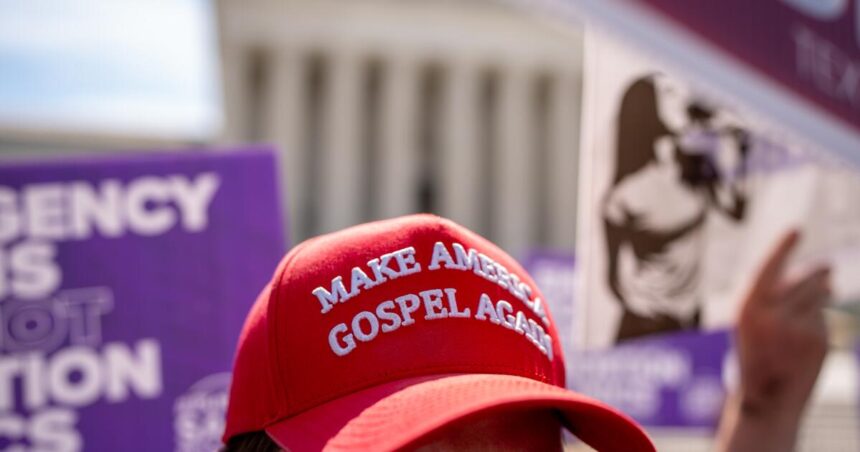Many factors explain why people in Western democracies vote for politicians like former President Trump, including economic concerns, regional resentment, and racial hostility. It has even been said that Trump supporters are “left behind,” “stigmatized,” and “alienated,” but these portrayals are dangerously off the mark.
First, they play on the self-victimization common to far-right movements, fueling conspiracies and support for the ideology. Moreover, they ignore the over-representation of historically powerful groups among Trump supporters: white, male, and Christian. Even today, these groups remain politically, economically, and culturally privileged. By any objective standard, the majority of Trump supporters are not marginalized, stigmatized, or alienated.
However, studies have shown that whites, men, and Christians still subjectively Exclusion Perceived social isolation may explain why so many show such unwavering support for Trump, and a nuanced understanding of how people feel included or excluded may help explain what Trump’s supporters really want.
Social psychology theory posits that there are two conditions that people need to feel included. First, they simply need to belong to a larger group, such as being White, male, and Christian in American society. Second, they need to feel that their unique background is respected and valued within the larger group. Thus, people can feel excluded from a group if they feel that their background is ignored or not respected, even if they belong to the group.
In a recent study, I explored whether this second factor is creating experiences of exclusion among Trump supporters. Perhaps a significant proportion of White, male, and Christian people experience belonging in U.S. society while also feeling ignored or disrespected as members of those groups. To be clear, they are objectively seen, respected, and even privileged. But previous research has shown that there is an increasing share of White, male, and Christian people who subjectively feel disrespected, disadvantaged, or ignored.
I used survey research to map the extent to which white, male, and Christian Americans feel they belong in U.S. society and that their backgrounds are respected. Generalizing from representative samples collected in 2016 and 2020, I found that about 21% of white Americans feel they belong firmly in U.S. society, but that they do not feel respected as a white group. Similarly, up to 20% of men and 35% of Christian Americans feel that their backgrounds are not respected.
This perception has political consequences: Compared to people who experienced both a sense of national belonging and respect for their background, those who felt disrespected were more likely to vote for and sympathize with Donald Trump.
His campaign has long appealed to members of privileged classes who feel slighted, as expressed in slogans like “White Lives Matter” and “Make Men Manly Again.” This rhetoric promises to “restore” attention and respect to those who subjectively feel ignored. Trump fuels and exploits this perception of neglect and neglect. Far-right candidates often vow to maintain inequality in favor of the privileged. Some members of the privileged classes are vulnerable to this pitch.
Their passionate support for existing inequalities underscores that these people are not marginalized: members of marginalized groups try hard to fit in, for example by changing their appearance to appear more like members of the majority. This is not the case with vocal Trump supporters who proclaim their identity and claim that their background constitutes a “true American.”
They refuse to fit in and seek to stand out, insist that “white lives matter” even when white lives are not threatened, defend heterosexual gender roles that do not need to be upheld, and promote typical Christian right lifestyle choices such as traditional marriage and childbearing.
The key to understanding why the privileged are so vulnerable to Trump’s appeal is the subjective perception of exclusion or marginalization. So how does Trump meet the emotional needs of people who feel excluded or marginalized? By highlighting aspects of their identity that they feel are not receiving proper respect.
This understanding also has implications for how other Americans should interact with Trump supporters.
First, researchers, journalists, and the public should be more careful in explaining support for Trump. Depictions of Trump supporters too often repeat scientifically disproven explanations, such as the belief that most far-right voters have low incomes and are simply protesting against political elites. This not only masks real discrimination and injustice against disadvantaged groups, but also fuels pro-Trump sentiment.
The casual description of Trump supporters as “left behind” is completely wrong. They are members of a dominant group that wants to remain dominant. After all, Trump supporters support a racist, sexist, and xenophobic ideology. Supporting far-right politicians is do not have It’s not a vote of protest, it’s a vote for the status quo.
Second, liberal parties will not win back votes by shifting to the right; rather, the strategy reinforces far-right rhetoric and support for those parties. A more promising approach would be to remind whites, men, and Christians of the attention and respect they already enjoy objectively. If some members of these groups feel a sense of belonging to the American nation but subjectively feel slighted, correcting these misconceptions may help these individuals feel accepted. In a polarized news environment, many Americans hold many misconceptions about members of other groups. Members of privileged groups may consume news that gives them the false impression that others despise them. Factual information that reaches members of such privileged groups may reduce the perception of neglect and disrespect.
Third, Democrats need to offer a liberal conception of what whiteness, masculinity, and Christianity look like. Vice President Kamala Harris’ campaign seems to understand this by choosing Minnesota Governor Tim Walz as her running mate. Governor Waltz embodies that liberal vision, both as a man who supports women and as a white Christian who embraces diversity. Other white Christian men could take a cue from him. They don’t need to feel left out.
This election is an opportunity to correct the problematic discourse surrounding support for Trump. The common assumption that white, male, Christian voters are marginalized reinforces a sense of self-victimization. Instead, a careful examination of personal experiences can bridge the gap between objective privilege and subjective feelings of contempt, potentially leading to experiences of inclusion among members of the majority who currently feel marginalized. Ultimately, doing so offers one way to mitigate support for racist, sexist, and polarizing ideologies in the United States and abroad.
He is a postdoctoral researcher at the University of Vienna in Austria. His research explores how group identities and emotions shape individuals’ perceptions of societal developments and motivate political responses to those perceptions.









